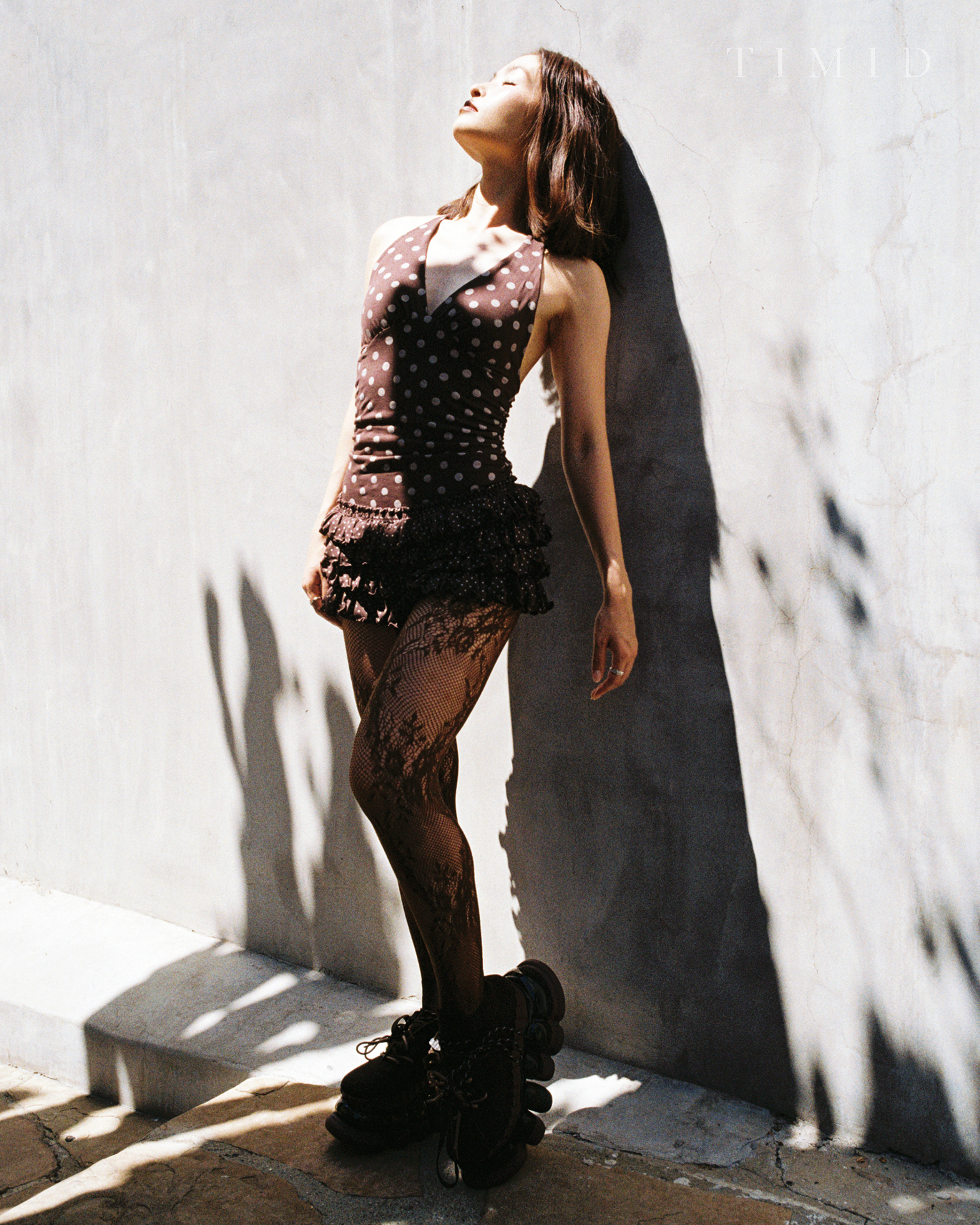

-
Talents: Maia Shibutani @maiashibutani & Alex Shibutani @alexshibutani
Photos: Ashley Seryn @ashleyseryn
Fashion: Lisa Hoang @lisanhoang
Makeup: Akina Shimizu @aki__makeup
Hair: Eduardo Mendez @eduardomendezhair
Photo Assit: Jer Aquino @jer.aquino
Video: Jonathan Ho @_jonathan_ho
Maia Shibutani and Alex Shibutani have spent their lives in motion. Long before becoming Olympic medalists, the siblings were just two kids passionate about skating. Over the years since their first visits to the ice rink, their curiosity for the sport became craft, and that craft became history. In 2018, they became the first Asian American ice dance team to medal at the Olympics. The sibling duo are also two-time US champions and three-time World medalists. Despite the accolades, their story certainly doesn’t end at the podium. In their seven-year hiatus from the sport since 2018, the Shibutanis have grown into authors, advocates, and cultural voices whose reach extends far beyond the rink.
Though their skating has taken them across the world, Alex and Maia remain very grounded in the creative and diligent spirit they had grown up in. The Shibutanis’ artistry is deeply intertwined with the values instilled by their parents, who had also pursued creative careers.
“From a very young age, we listened to various classical pieces because that was what our parents enjoyed,” Alex shared. “Fundamentally, our parents’ commitment and dedication to music showed a good work ethic, and we were raised that way.”
Lessons in diligence were applied to everything Alex and Maia pursued, not just ice skating; however, the added benefit to their parents' careers in music was the openness to partnership and collaboration. “Our parents were soloists, but they also understood about playing and harmonizing with other musicians in an orchestra, for example,” Alex said.
That early model of balancing individuality and harmony became the core principle of Alex and Maia’s partnership. Especially when working with family, Maia admits that people typically give mixed reactions—“One is where they think it's amazing or they think it's so difficult. The real answer is a mix of both.”
“A successful partnership is like building a muscle,” Alex compares. Working with family in particular, he explains, is a process of growing through the friction. “Life throws a lot of stuff at you. In our experience, whether on the ice or off the ice, the times when we really doubted ourselves individually were moments that created and fortified our bond,” he said.
While Maia certainly agreed on the difficulty of this process, she felt obliged to mention the advantages. “When I’m looking at Alex at the Olympic Games, I can sometimes feel like I'm visualizing him in the present, but I also see him from when we were kids. I wouldn't trade it for anything.”
As kids, Alex and Maia began skating at seven and four, respectively. The Shibutanis joked that they didn’t exactly step into the rink with Olympic dreams in mind, especially not at that age. When Maia first laced up, Alex tagged along—not to skate, but to sit rinkside and finish his homework.


Despite their early age, Maia knew that she loved skating and the feeling of ice long before she knew what she was doing or how to do it. On the other hand, Alex grew more interested in the sport as he omitted hobbies he was not truly passionate about. While he worked hard playing the violin, his lack of passion prevented him from truly enjoying it. Skating was a different story for both siblings, and the Olympic track was set.
“When we started skating together, it was a possibility to dream, and it wasn't just a dream,” Alex noted. “In 2006, two years into skating together, we watched our first Olympics together, and we watched ice dance in the games. Wouldn’t it be amazing if we could be there too one day?”
Around that same time, the skating duo had just won a competition at the intermediate level. They still had the novice, junior, and senior achievements ahead of them, but their early success fueled their growing ambition, which opened the door for the siblings’ groundbreaking win on the Olympic stage just 12 years later. On the surface and written within major headlines, the Shib Sibs’ victory was framed as a breakthrough for Asian American visibility in figure skating. On a deeper level, their win fell close to the Day of Remembrance for Japanese Americans, making it personally meaningful.
“Our grandfather on our mom’s side was incarcerated in Jerome, Arkansas. His family, like many other Japanese American families during that time, lost everything. Grappling with our past and how it influenced our upbringing and our experience in sport gave us a lot of healing. When we were coming up in the sport, we definitely experienced racism. We did not know how to handle it, other than, thankfully, through family,” Alex shared.
Further, being Asian American also acts as “a bridge between places,” which Maia believes is a unique strength for the siblings in their community. Even after Shib Sib’s Olympic accomplishment and personal meaning, Maia considers herself an amateur in figure skating, but with the mindset of a professional athlete.
That mindset and the unshakable desire for growth have always defined the Shib Sibs. Stepping away from the competitive sport after the 2018 Olympics, they gained a renewed sense of time. Four-minute skating programs were insufficient for the Shibutanis to tell their whole story.
For the first time since childhood, their lives weren’t solely dictated by training schedules or the competition. In retrospect, that distance allowed them to see their sport and themselves more clearly than ever before. They explored new forms of expression that reflected who they were becoming and who they wanted to become rather than who they had been. As usual, Alex and Maia tackled these herculean tasks together.
Alex and Maia first had to slow down, using skating as a metaphor to understand that challenges weren’t necessarily obstacles, but lessons. In their rise to stardom, the Shib Sibs had been labeled as the “King and Queen of twizzles.” Yet, as Alex explained, their mastery of the technique was born out of difference, not similarity: “As similar as you may think Maia and I are, our natural dominant rotational directions are different.”
Adapting to this challenge became both a technical and emotional exercise in balance. While the audience watches the result of years of adaptation, the Shib Sibs remember an important lesson in patience and creativity. “[Twizzles], in particular, taught us a lot about not avoiding things that you’re not good at originally,” Maia reflects. “It's much harder to have the discipline to be awkward or make mistakes, but we learned so much through that process.”
The Shib Sibs’ hiatus required that same persistence and adaptation. Luckily, they’d been preparing for it their whole lives. In the seven years since, they’ve written four books and acted as sports envoys for the US Department of State, all while using their platform to champion Asian American representation in media and sports. In particular, Alex and Maia’s work targets younger audiences who are deeply aware of what it means to grow up where representation was rare. The fundamental vocabulary was of European and Latin influence, particularly in ice dancing.
“In a subjective sport where comparison is a natural part of it, we internalized that their environment influences people's exposure to culture, art, and music. As a sport, ice dance wasn't necessarily designed for people like us to succeed,” Alex shared.
This was an impetus for the siblings’ writing and cultural exchange work. Humanitarian and purposeful, as always, Alex and Maia described it as the “energy” they hope to put out in the world. In this line of work, Alex and Maia have worked within like-minded communities, primarily the LA-based non-profit organization Gold House, where they made lasting friendships with prominent Asian Americans pursuing similar goals in representation.

Maia shared that they have met a community beyond figure skating and friends who have come to know them as more than skaters. “One of my really good friends is Chanel Miller, a brilliant author. Life just feels so much fuller to be able to talk with her about the process of writing books and just spending time together.”
Now returning to the Olympic stage, Alex and Maia are skating forward, as always. This time, though, they are moving toward something more personal, guided not by expectation but by choice.
“I want to share my growth and show that on the ice. Skating is how I express myself in my most true form,” Maia said. Maia still holds the mindset of a professional athlete, but this time, she redefines what it means to win. She prioritizes showing her honest identity more than anything else. “When I was a younger athlete, I was striving to be liked because I was in a judged sport. Now, I have so much faith in what I bring to the table that being proud of my process is enough.”
Alex summarized it best: “Our return is for us.” Competition still matters for the Shib Sibs, but it now serves as a source of motivation rather than pressure. There will be no take two or three for anyone this upcoming February in Italy, but Alex and Maia are simply grateful for their one chance as they enter their 21st year as an ice dance team.
“We were writing books and thinking a lot about the messages we were putting out into the world, " Alex said. “Those reminders grounded us in our purpose and opened our eyes to this possibility. We’re pleased about being where we are.”
With the future ever-present in mind, Alex and Maia are even looking past the Olympics and into their legacy. Honors like being in the US Figure Skating Hall of Fame are part of it. Representation and accessibility to the sport are the other.
"If there is a legacy that we hope to leave, it is leaving things better for the representation in our sport. It takes one person to break through, but then it requires diligence. We care about our sport, and our sport is made better with greater diversity and more perspectives being shared,” Alex shared.
When Alex and Maia don their skates and step foot onto Olympic ice once more, the world will be watching in anticipation. Only this time, Alex and Maia's expectations for themselves are more than just another shot at gold. Their performance in Italy will celebrate everything they’ve built and overcome together as a family. What began as a childhood dream to see themselves on the grand Olympic stage has evolved into making that very stage more open for others to see themselves there, too. It's a whole circle journey that captures how far they’ve come and how much they’ve given back. Since the ice has always been their blank canvas, the Shib Sibs are now more ready than ever to create another artistic masterpiece.

